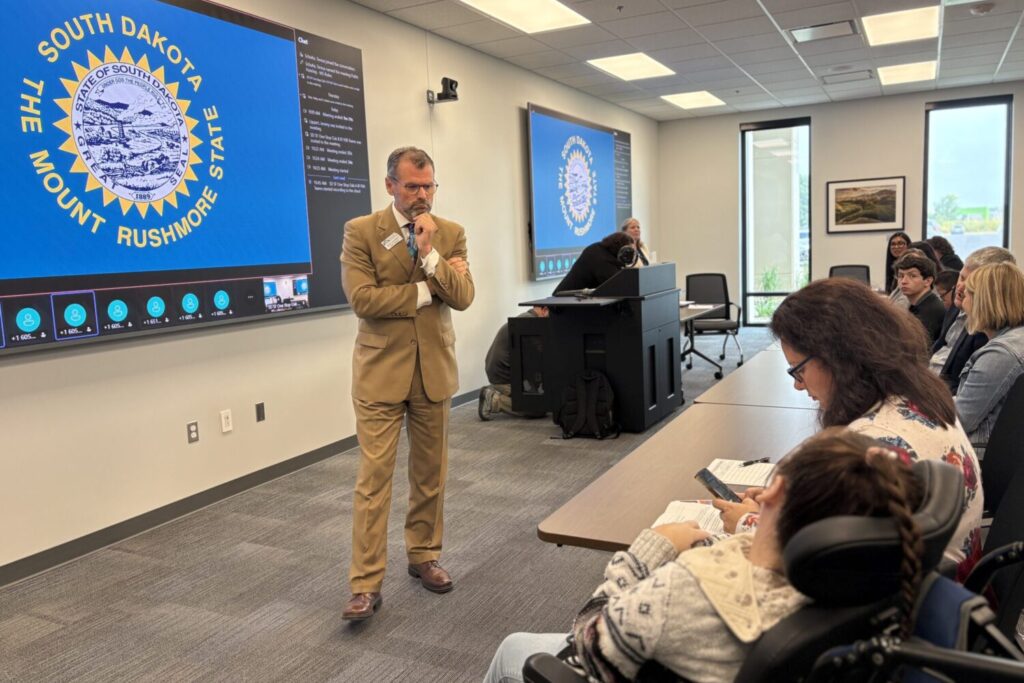South Dakota Department of Social Services Secretary Matt Althoff fields questions from advocates for people with disabilities on Sept. 10, 2025, during a public hearing at the Sioux Falls One Stop building. (Joshua Haiar/South Dakota Searchlight)
SIOUX FALLS — Emotional testimony spilled out Wednesday as about 75 people pleaded with South Dakota social services officials to halt a proposed rule change that testifiers said could drastically slash Medicaid reimbursements for LifeScape, the state’s primary caretaker for people with complex disabilities.
“You cannot change this funding and ask us to ‘hope’ that it’s OK,” said Erin Horstmeyer, whose disabled son received care from LifeScape before he died.
“Families like mine, the people in this room, have lived on hope every single day of our lives,” she said. “All we do is hope, because we don’t know what the future holds for kids that have multiple disabilities.”
At issue is the state Department of Social Services’ plan to revise the methodology it uses to reimburse providers through Medicaid, the joint federal-state program providing low-income health insurance and disability assistance.
A rule dating to the 1980s allows LifeScape to be exempt from the state’s typical Medicaid reimbursement rates, according to LifeScape’s Leah Orsack, resulting in more funding for the unique care the organization provides. According to Kristin Tuttle, also of LifeScape, the proposed rule change would reduce LifeScape’s annual funding by about $9.7 million. LifeScape’s locations in Sioux Falls and Rapid City serve more than 3,300 children and 500 adults in South Dakota.
At the outset of the public hearing at the state’s One Stop building in Sioux Falls, however, Department Secretary Matt Althoff said the initial proposal that sparked the outcry would no longer be pursued — news that surprised both the organization and those in attendance.
He said the proposal came about due to the department needing to modernize its decades-old reimbursement system in alignment with federal guidance. He said the methodology for reimbursing LifeScape will still need an update, but did not offer specifics on a new plan.
“We have to modernize the methodology,” Althoff said. But when pressed on whether LifeScape’s bottom line would hold steady, he conceded, “We don’t know that.”
Althoff also acknowledged, “South Dakota is a lot worse off without LifeScape. We need LifeScape to be there.”
GET THE MORNING HEADLINES.
The two-hour hearing was filled with tearful testimony from parents and advocates describing how LifeScape’s outpatient therapies and specialized programs helped their children walk, talk and participate in daily life. Many stressed there are no comparable providers in the state, particularly after Althoff suggested others exist.
Some attendees bristled at Althoff responding to speakers during the testimony period of the public hearing, saying it gave the impression the department was dominating a forum meant for public input. One attendee attempted to seize the microphone from Althoff and spoke over him when he declined.
The advocates urged the department to delay any changes until the real-world impacts are better understood.
“At first, I thought this proposal must have been the work of some detached politician, cause we have plenty of those. But no, it’s you, the Department of Social Services. The man in the tan suit,” said parent Semehar Ghebrekidan, pointing to Althoff.
A panel of state lawmakers, the Legislative Rules Review Committee, is scheduled to consider the rules package on Oct. 7. Until then, Althoff said the department would continue negotiations with LifeScape.


